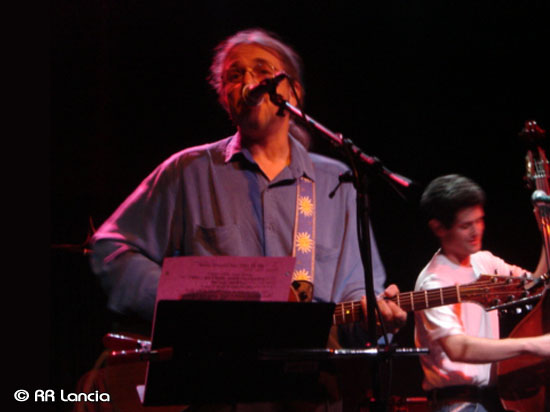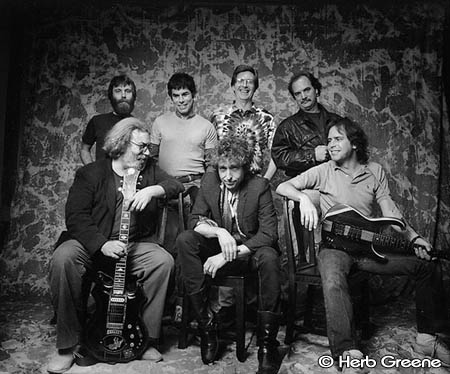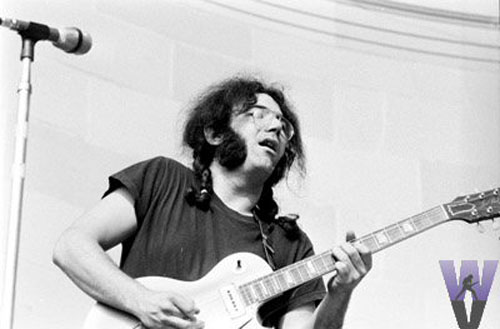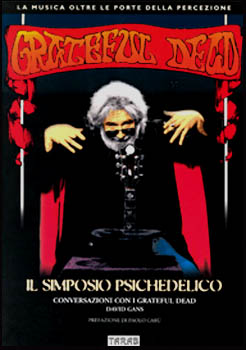![]()
Exclusive
Feature:
'Feast
of Diamonds'
An
August Conversation with
David Gans
Conducted
and composed by RR Lancia. Published August 9, 2006
Worthy of One So Particular
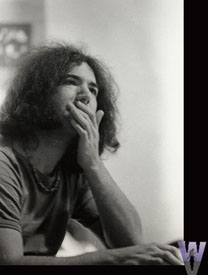 'Jerry,
even in your silence, the familiar pressure comes to bear, demanding
that I pull words from the air'. Lyricist Robert Hunter felt that weight,
and it was no wonder.
'Jerry,
even in your silence, the familiar pressure comes to bear, demanding
that I pull words from the air'. Lyricist Robert Hunter felt that weight,
and it was no wonder.
He was composing an ode "worthy of one so particular".
I felt a similar pressure driving up the dusty interstate to meet a
man whose radio program I'd listened to like the Fireside Chats.
Who better, I thought, than David Gans, to comment on the state of the
scene eleven years after Jerry's passing.
I
came in knowing one thing about David. He seemed to be one of the only
guys Jerry and Hunter and Phil and the boys would really sit down and
open up to, and these guys seemed to ask all the right questions.
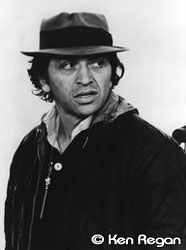 "Jerry
was the greatest interview ever. He was a guy who interested in life.
He was well read. And he paid attention".
"Jerry
was the greatest interview ever. He was a guy who interested in life.
He was well read. And he paid attention".
Feeling
like a moth-to-the-flame, I felt compelled to bombard him with questions
about the men whom I'd held as heroes or something like it: Hunter,
Garcia, Owsley Stanley, and most namely, Bill Graham.
"These
guys had their stuff together enough to know what they wanted to do.
They were able to stay in control of it. Many people from the 60s weren't
able to have that staying power", Gans explained.
"That's true in any situation. There will always be people with
brilliant ideas who can't follow through and make it last; others have
the vision and the personal energy/power/will to lead others and make
it work in the long term".
The band as a whole, and the community itself, was also part of that
vision.
"For whatever reasons, the Dead lasted long. They came out of a scene
in which everyone was open-minded. People were bringing lots of intellectual
disciplines together, to make new things happen. They just were really
good at it. And they stuck to it, in a way".
Gans
added with a smile: "They would be the first to
say: we were just part of a neighborhood music scene".
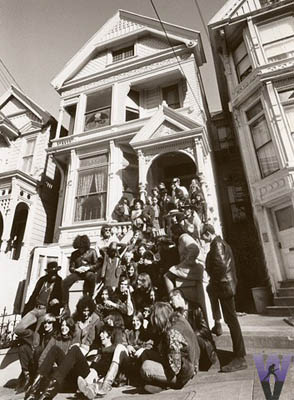 The
eclectic quality of the music resonates for David. "Phil
brought a bunch of music to those guys. Mickey brought stuff. Everybody
came to it from a different kind of musical perspective and forged something
together to take it all into account".
The
eclectic quality of the music resonates for David. "Phil
brought a bunch of music to those guys. Mickey brought stuff. Everybody
came to it from a different kind of musical perspective and forged something
together to take it all into account".
However, just because he's produced the Grateful Dead Hour since 1984
and written a stack of definitive books on the subject does not mean
Gans is as forgiving as your average Deadhead.
"The
whole Grateful Dead exalts itself in such a way that we tend to think
of ourselves -- people say that Jerry was the greatest guitar player
that every lived. That's a ridiculous contention. He would be the last
guy to ever describe himself like that."
Hunter's elegiac words for Jerry echoed: 'I feel your silent laughter,
at sentiments so bold'.
Playing
the Deadhead Devil's Advocate, I recalled Dylan's homage to Jerry: 'He
really had no equal... there's a lot of spaces and advances between The
Carter Family, Buddy Holly and, say, Ornette Coleman, a lot of universes,
but he filled them all without being a member of any school'.
David certainly agreed: "Jerry was a great musician
and a tremendously broad-minded guy. That was the most amazing thing
about him. The different stuff".
But
the idea of being critical, or of being a discerning listener, is paramount
to Gans.
"A friend of mine said the Dead were the most
overrated band by their fans, and the most underrated by everyone else.
People who really love them, they don't really have a perspective.
As they got older, the performances weren't as good. They weren't listening
to each other. The mid 80s were really hard for a lot of us fans. We
could tell they weren't locked in".
Having seen my first shows in the late 80s, I realized I was witness
to some kind of renaissance as the band flourished again.
Gans remembered: "I know because I was there.
There were a tremendous amount of drugs and it wasn't a healthy time.
And the music was good in a way, but it was also -- Cocaine is an alienating
force".
He made a distinction between some of the debauchery of the 80s, and
the principles that the band were founded upon.
"You start making music on LSD, which makes you all think together,
and then cocaine makes you all go in separate rooms".
Deadheads know it's never been about the drugs. It's always been about
the music. How then, did drugs have such impact on the music itself?
"Something important about the group mind couldn't
happen. And so through that period, it made it hard for the cohesiveness,
or the group mind, to really happen".
Inside Each Other's Hearts
Perhaps the most cryptic story Gans shared was set at Berkeley Community
Theatre in October of 84.
"They put these message boards -- sheets of butcher
paper out in the lobby -- and felt pens... your messages for Bobby,
your messages for Brent... the funniest one I remember was: Jerry, do
you sleep with your beard over the blanket or under? That kind of level
shit", David quipped.
"I was so sort of disturbed by how disjointed
the music was that I wrote, Wake up! It was clear they weren't
hanging together".
He distinguished between this lack of connection, and the heyday of
the band: "You would hear a subtle hint about a song, and then they
would sort of all slowly and perfectly get there together, or one at
a time. Instead of, 'All Along the Watchtower' winds down and then Jerry
plays 'Black Peter'".
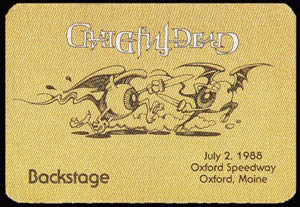 Another
watershed mark came in 1988 at Oxford, Maine. "That's
just a really high moment from the summer tour. Not everything was all
bad. But it was becoming more globalized. They didn't have to be inside
each other's hearts as much to make it happen".
Another
watershed mark came in 1988 at Oxford, Maine. "That's
just a really high moment from the summer tour. Not everything was all
bad. But it was becoming more globalized. They didn't have to be inside
each other's hearts as much to make it happen".
This notion of being inside each other's hearts made more sense in the
context of Gans' Herculean task as a presenter of the Dead's volume
of work, namely the age-old phenomenon of, "...
it felt good at the time, but it didn't sound that good on tape".
"There is a difference between being a fan, and
being a radio producer, and being a record producer, and a band member.
These are levels of engagement, and levels of perfection.
That's why they trusted guys like me to make the decisions on what to
put out. Because they were too close to it. And they realized that they
couldn't be as objective -- or couldn't be as forgiving -- as they would
have to be to put stuff out".
It became clearer why that as the Dead disengaged from the releasing
process, they entrusted the music to Gans. "You
want to put their very very best foot forward", he stressed.
"What I play on the radio and what we put on a
box set are two different levels of acceptability. If you are going
to put it... in the discography, it's got to be as good as it can possibly
be. It doesn't mean it has to be perfect... "
Jerry as a mortal man of flesh and bone was a theme that did not escape
the conversation.
"He was kind of tired. Also remember, he was slowly
dying. His arteries were clogged, his lungs were always bad. He had
a hard time singing. So the stuff that we love, and the stuff that's
enshrined in the historical record, are two totally different things".
How then, will the historical record be impacted, by the fact that all
of the Dead's intellectual property just left the Bay Area on a truck
to LA and Warner Brother's Rhino Records?
David reassured the fans: "They're all pretty
decent guys... they became a record label because they loved music.
James Austin, who is the main guy I worked with at Rhino, doesn't look
like a Deadhead. He looks like a guy you'd see polish up a '56 Chevy.
He'll tell you: it was never the same after Pigpen died. Because he
was seeing the Dead back then. There are a lot of guys in Rhino that
are Deadheads... There's some depth there".
The handing over of the Vault's golden key shook me, as it did many
Deadheads, but Gans saw a sliver of irony there:
"There's a sort of built-in contempt for corporate
America which is somewhat incongruous given that the Dead were a corporation
too. They ran their business. They always dealt with corporate America.
They always worked with the record companies. They always worked really
hard and wanted to do well".
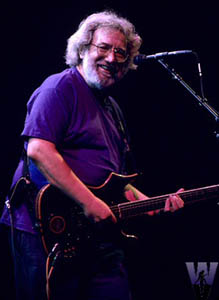 Accidentally
Like A Martyr
Accidentally
Like A Martyr
The desire for an album's success, or disappointment at its relative
failure, provided one of the most poignant insights on not only Jerry
Garcia, but the archeology of David Gans.
"Jerry was heartbroken about Cats under the
Stars. When I was working on the Garcia box set... I was looking
in the Deadbase and realized that when Cats came out,
the Dead were incredibly busy... they played 100 dates in 1978.They
went to Egypt.
Jerry never took the time off from the Grateful Dead to do the stuff
he needed to do to promote. He didn't go on a tour with Garcia band.
He didn't do what you needed to do to ensure that record's success.
He either didn't care, he didn't want to, or the Grateful Dead weren't
comfortable with him taking time off to promote that record, or, just
the idea of promoting a record: 'that's not what we do -- we play
music'. You see he just sort of put his head down and played with
the Grateful Dead and did what they did".
Maybe that's why Deadheads love Jerry Garcia Band and Garcia's side
projects. I know the hair on the back my neck stood up when he mentioned
the Garcia box set, and the previously unreleased jewel which seems
to encapsulate Jerry as the reluctant leader, 'Accidentally like a Martyr'.
Gans finally beamed: "I found that track!"
"I got hired to produce that All Good Things
box set. My job was to listen to every scrap of multi-track tape
in Jerry Garcia's archive.
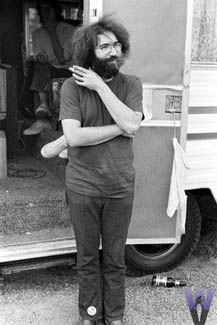 I
spent a couple of months doing it. I listened to literally every reel
from all of his studio tracks. I listened to every single one. I made
notes, and I picked out all the bonus tracks to put on the CDs. I'm
the guy that found that".
I
spent a couple of months doing it. I listened to literally every reel
from all of his studio tracks. I listened to every single one. I made
notes, and I picked out all the bonus tracks to put on the CDs. I'm
the guy that found that".
For
some comic relief, I asked David if he did his dishes or paperwork during
such a marathon project. Secretly, I hoped it was a scene out of Indiana
Jones and Raiders of the Lost Ark.
It was somewhere in between.
"It was on a reel that had been something else.
They turned the reel over and scratched off what was in a previous session.
It was a day Jerry was working stuff out.
I made CDs of the interesting parts, and I would take those home and
listen to them some more. But then I had to make the decisions of what
to put out".
We all should have such decisions. But Gans, with an unassuming quality
common in the inner circle of the band, magnified here that idea of
gestalt: the whole being greater than the sum of the parts.
"I firmly believe that that none of these decisions
should ever be made by one guy."
"I called Blair Jackson. We're neighbors, and I've known him for almost
30 years... so it was real easy to work together. He and I and Steve
Silberman got hired to do the So Many Roads box set".
Even in his humility, Gans knows how coveted his day job must be.
"I'll never forget one day we were listening,
stoned out of our minds, and my wife comes home: me and Steve
and Blair sitting around listening to tapes". Gans howled to his lovely
wife Rita: "We're getting paid for this!"
I'd love to have been a fly on the wall in that basement. We all have
our favorite jams. I wanted to know how things like Gans' beloved 'Beautiful
Jam' from Portchester '71 made the cut.
"It was a really collaborative and thoroughly enjoyable process by three
guys that are really good friends that really love each other and love
the music. There was never any I'm right and your wrong shit".
A Concerted Sense of Quest
The idea of Listening permeated the conversation, whether talking about
the Dead, his musical research, or picking up a guitar and hopping onstage.
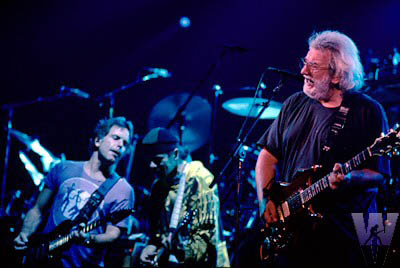 "That's
the most important thing about music: to listen."
"That's
the most important thing about music: to listen."
"For
musicians, especially improvisational musicians... a lot of jazz is
people taking turns blowing. Grateful Dead music was people building
musical structures live and in the moment.
You have to be really sensitive to what the other guys are doing and
supportive of what they're doing... it's everybody together doing something
that nobody ever did before. You do it by listening and being supportive.
You can't be selfish. You have to be generous. You have to let the music
tell you what to play. You have to be moving forward.
It might be Bob Weir line I'm not sure... they referred to it as a concerted
sense of quest".
The Grateful Dead were formulaic only in certain aspects, like the structuring
of their setlists in later years. However, I'd never heard such an incisive
observation of their modality as I did from Gans:
"You have to play something that harmonizes, or
is counterpoint, and you have to intuit when it's going to end. You
have to build up this tension, and then open up into something else.
And that requires sensitivity and kindness. Everybody respects what
everyone else is doing."
Stating a musical idea, and the idea of listening, once again brought
Gans back to the Dead of the 1970s.
"You
hear that stuff all through early '70s dead... Phil will play a tiny
bit of the 'Dark Star' riff. It's a signal and everyone knows. They
don't just lurch into it. They progress in an orderly manner to the
next thing".
I smiled at the thought of the Dead's interstellar tangents as an 'orderly
manner'. Gans reveled: "Those are things you want
to have happen. You live for those moments."
Never Quite Catch the Tune
One fan moment I had to indulge was Jerry's subtle instrumental of 'Handsome
Cabin Boy' for St. Patty's Day at Landover's Cap Centre in 1993. When
my friend and I caught the old Irish sea chantey version on the Grateful
Dead Hour that next week, it confirmed to us that indeed, someone
else had heard that secret riff embedded in Space. Even the hallowed
Deadbase incorrectly lists it as 'Two Soldiers'!
"I gotta tell you", David offered, "It's
so cool to know that you were out there paying attention... I didn't
make it a big deal about it on the radio show. I was just trying to
present all the magic I knew about the Grateful Dead, and to know that
there was people out there listening to it, and getting it, is a very
rewarding thing".
He came from a similar school. "My friends came
from a time when music was the most important thing. The culture was
centered around music.
"Jackson
Browne came out with an album, or the Beatles, and you listened to it
forty times in a row because you wanted to know every corner of it and
feel everything that was in it and every message and every level of
meaning".
For such a music junkie, pouring over and selecting the music of your
favorite band sounds too good to be true. But again, Gans is not your
typical Deadhead.
"By the time that thing started happening, I was
already living my life. I was always more interested in my own work,
my own creativity. It's weird to say, because it became my day job,
but it wasn't my life, like it was for some people. I was a music journalist.
I was always writing my own music. I was always playing my own music".
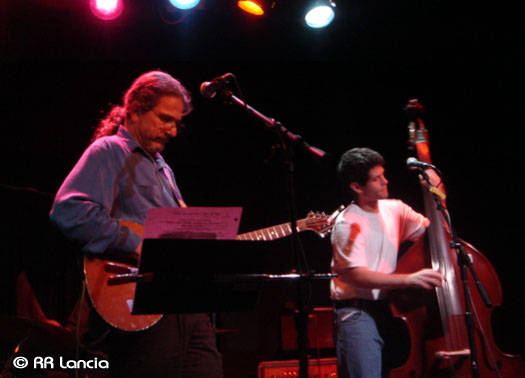
And
play music he does, quite well, and with a level of impact that's even
Robert Hunter-like. While rapping at his bandmate's daytime gig, Gans
was invited up onstage. After hearing so much about 1970s Dead, I rendered
near shock that with the catalog at his fingertips he chose 'Lazy River
Road' [see
the video - 3M].
"It's just the sweetest damn song. Over the years
I've got more and more into doing my own tunes and less and less into
the tunes of the Dead in terms of being a 'cover-head'. I've been playing
music and writing songs since before I heard the Grateful Dead... but
they're in my musical DNA. The more I sound like myself, the less I
rely on the Dead or anyone else's tunes.
I find that the Dead songs that stay with me are just a handful. 'Lazy
River Road' is one.  I've
made it my own song. My arrangement isn't that different from the Dead,
but it feels so good to play it. I never want to be imitating someone
else. It's a great American song. It's not a hippie song or a psychedelic
song".
I've
made it my own song. My arrangement isn't that different from the Dead,
but it feels so good to play it. I never want to be imitating someone
else. It's a great American song. It's not a hippie song or a psychedelic
song".
With
all the riding of coattails, and the cashing-in that seems to pervade
the music world, what struck me most about David Gans was his sloughing
off of the moniker 'that Grateful Dead radio guy', and his capacity
to create and move forward.
Maybe that's why he was reticent to characterize the 11th anniversary
of Jerry's death as either a celebration, or the hurt gets worse, and
the heart gets harder.
"I
don't know exactly how I feel about all that stuff. I think its more
I honor Jerry and I attend to the anniversaries because it matters to
the audience but it's not - I don't want to offend the deadheads...
being the icon and stuff was not fun for him.
It's a loss, but life goes on, and everything is okay. And Phil's playing
and 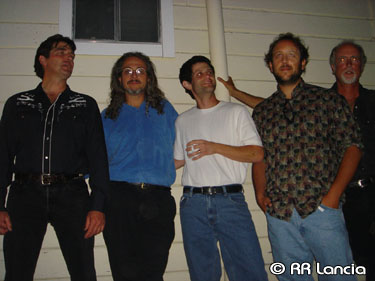 Bob's playing, and Mickey and Billy".
Bob's playing, and Mickey and Billy".
Gans
is playing too. He calls his Honky Tonk Hippies the best band he's ever
had, but don't expect GD nostalgia. The continuation of his 'musical
adventures' were inspired by bands like Commander Cody and his Lost
Planet Airmen and Willie Nelson, and includes a standup bass and pedal
steel. Kicking off their mini-tour in Larkspur, CA, the Honky Tonk Hippies
pulled off a mellifluous version of Bob Dylan's 'I'll be your Baby Tonight',
with David finding his voice.
And if I know Gans, he'll remain one of the true stewards of our scene,
serving the music, still sifting through the diamonds with his jeweler's
loupe, and painstakingly uncovering our most radiant facets.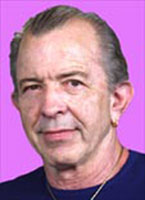 ...
..
...
..
Garcia's
thoughts on Owsley 'Bear' Stanley, whom David scored an extremely rare
interview with in 1991, shed light on Gans' meticulous research in A
Signpost to New Space: "We try
to display as much quality as possible in the hopes of being able to
refine pieces of what we do", Garcia explained. "And that's the thing
that Owsley does like no other being that I know can do or devote his
attention to, and this is that thing of purification".
That idea of displaying quality, and refining pieces to the end of purity,
was the garland of sacred trust bestowed on Gans by the band.
After all, Jerry prepared much of this beautiful feast that we so ravenously
devoured, but it was guys like Gans who presented it, or served it,
to the fans.
And they say service is a most divine vocation, and a supreme art.
MAKE YOUR COMMENTS AND LEAVE FEEDBACK ON THIS PIECE HERE
For all things Gans: http://www.trufun.com/
EAST
COAST TOUR KICKS OFF 8.12.06!
For Honky Tonk Hippies and other Gans gigs: http://www.dgans.com/gigs.html
And of course, the Grateful Dead hour: http://www.gdhour.com/
VERY SPECIAL THANKS TO DAVID GANS!
Conducted
and composed by RR Lancia. Published August 9, 2006
© 2006
www.philzone.com
and www.2012productions.com.
All rights reserved.
-- online or offline -- without the express
written consent of Philzone.com.
However, we certainly encourage you to link here.
. .
. .
